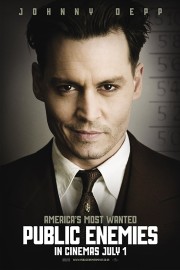Public Enemies
In Michael Mann’s films, actions define character. That’s what draws us into the otherwise corrupted worldviews of characters like Robert DeNiro’s criminal from “Heat,” Tom Cruise’s worldly sociopath in “Collateral,” and now, Johnny Depp’s transfixing performance as John Dillinger in “Public Enemies.” Depp isn’t showboating like he did as Captain Jack or Willy Wonka but getting deep into his character- like he did with other real-life rebels J.M. Barrie and Ed Wood- and showing us what makes him tick. It’s so effortless a performance it borders on performance art.
Working with Mann- the modern master of exploring the criminal world in films from “Heat,” “Collateral,” “Manhunter” (adapted from Thomas Harris’ “Red Dragon”), and the underrated “Miami Vice”- has let him put his unique twist on this rebel without a cause. In 1930s Chicago- Hell, the country in general- during the Great Depression, Dillinger became something of a folk hero when he and his accomplices (including the likes of Pretty Boy Floyd (Channing Tatum), Baby Face Nelson (Stephen Graham), and others) held up banks that screwed over the working man. He never took people’s personal money, though- he was just there for the banks’ funds.
In 1933, after he breaks out some of his compatriots in a thrilling daylight scheme at Indiana State Pen (where he just spent 9 years), FBI chief J. Edgar Hoover (Billy Crudup, using mannerisms and speech as weapons of a corrupt morality of good) has had enough, and so he makes recent hero Melvin Purvis (Christian Bale) the chief of the Chicago office, and puts him in charge of capturing “Public Enemy No. 1” himself- Dillinger. The next 140 engrossing minutes is about the cat-and-mouse that eventually leads both Purvis and Dillinger to the famous Biograph Theatre in Chicago, where Dillinger’s prostitute friend Anna Sage (Branka Katic) leads Purvis and the feds to the place where Dillinger was shot in 1934.
In each of the films above, and now here, Mann- who collaborated on the script (inspired by Bryan Burrough’s “Public Enemies: America’s Greatest Crime Wave and the Birth of the FBI, 1933-34”) with Ronan Bennett and Ann Biderman- uses cinematic craft to get into the minds of his characters. His editing keeps things tighter than the 140-minute running time sometimes feels, and puts you into the thick of the action with sly suspense, but his greatest behind-the-camera assets are Dante Spinotti- the masterful cinematographer (of “Heat” and “L.A. Confidential”) whose high-def artistry is probably the best case yet for the use of digital over film; his close-up intimacy may be jarring at first, but it’s riveting in shootouts- and composer Elliot Goldenthal, another “Heat” veteran whose mournful, minimalist score signals the impending doom for Dillinger, who’s having too much fun today to think about tomorrow.
That makes love a tricky prospect, but he finds it in coat check girl Billie Frechette (Marion Cotillard), who’s taken aback when he admits what he does, but nonetheless finds herself drawn to his audacity and assertiveness. Cotillard isn’t in the film nearly enough, but the Oscar-winner (for “La Vie en Rose”) is brilliant in letting us see the devotion in Billie’s eyes to Dillinger, especially during a brutal police interrogation near the end that Purvis puts an end to with blunt force. As the G-man in charge of getting Dillinger, Bale shows the single-minded conviction and ambition in Purvis, who has his own methods in mind for getting Dillinger, even though his boss Hoover would prefer him to do things his way. Purvis later took his own hand, having been disgraced by Hoover (who wanted all of the credit for Dillinger’s capture/death to himself), but we get the sense in this film that for Purvis, he was most alive when he was on the hunt.
And it’s that dichotomy between hunter and hunted than enthralls Mann the most in “Public Enemies.” Like Al Pacino and DeNiro in “Heat,” cop and robber are two sides of the same morally ambiguous coin in “Public Enemies.” In another collaboration between two of the best actors of their generation, Depp and Bale bring all of their craft to a genre film that strips that genre of its’ romanticism, and gets to the rough reality on both sides of the action. It’s hard not to have fun watching it, though- Mann lets his actors loose. The result is an unlikely match made in movie heaven.










